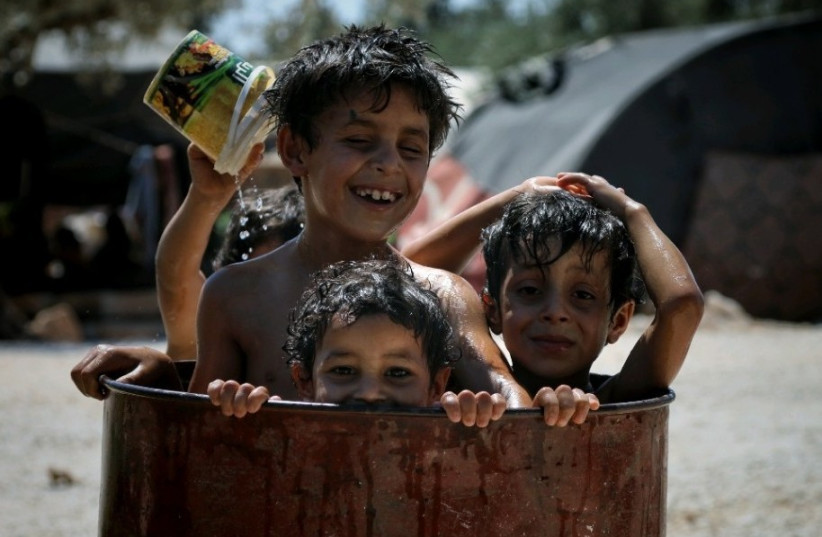No aid in Idlib as Assad army targets rebel-held northwest Syria after earthquakes

Opposition-held areas' ability to respond to last week’s massive tremors is threatened by a military offensive from the Russian-backed government
The Idlib Governorate in northwestern Syria is facing rising tension between rebel forces who control the area and President Bashar al-Assad’s military in the wake of last week’s devastating earthquakes.
Shortly after the earthquake, the Syrian military shelled the towns of Kansafra and Al-Habata, an official from the Syrian Salvation Government told The Media Line in an exclusive interview. The Salvation Government, an amalgamation of groups all opposed to the Assad government in Damascus, has been the de facto government of Idlib since 2017.
The atmosphere at the checkpoints to the south of Idlib is particularly tense, the source said, especially along the strategically important M5 highway.
No humanitarian aid
Residents of Idlib have been unable to access humanitarian aid intended to help survivors of the earthquakes.
“There are no roads linking the areas of the revolution with the capital. The regime continues to falsely claim that it is providing aid and humanitarian aid convoys from Arab and friendly countries,” the Salvation Government source said. “The revolution has not received any aid so far and we are the most affected by this earthquake.”
Idlib’s 4 million residents have effectively been in a constant state of war ever since Syria’s civil war broke out in 2011. The governorate was taken over by rebel forces at the start of the war and came under the control of the Salvation Government in 2017 following a peace agreement between various rebel factions.
As the Assad government consolidated its power in southern and eastern Syria, Damascus launched a series of Russian-backed offensives against rebel-controlled northern Syria, including Idlib, starting in April 2019. The main goals of the operation were to capture the M5 highway and to overthrow the Salvation Government and its militias, particularly the Sunni Salafist group Hay’at Tahrir al-Sham.
These military campaigns have seriously undermined the Salvation Government’s ability to respond to the effects of the recent earthquakes, Health Minister Hussein Bazar told The Media Line.
“Damascus was a main cause of this disaster [and] has exacerbated the situation by the intensive targeting of the infrastructure, including our healthcare,” Bazar said. “The regime has deliberately targeted medical facilities, our clinics and ambulances, which affected their work during the past years, and put many of our hospitals out of service.”
Although Syria is receiving aid from the international community following the earthquakes – the US temporarily lifted its sanctions on the regime to allow aid flights into Damascus and Aleppo – Idlib has not received international assistance. Idlib and the surrounding area “have not received any aid so far and are actually the most affected,” Bazar said.
Almost two weeks on since the earthquakes, the death toll in Turkey and Syria has passed 46,000. Emergency humanitarian support is transitioning away from search and rescue operations in favor of support to those left homeless by the earthquakes.
The shifting lines of the civil war in Syria’s northwest has made Idlib particularly vulnerable to damage from the earthquakes. The region is one of Syria’s most densely populated, in large part due to the presence of internally displaced Syrians fleeing the conflict, Bazar said.
One of those affected directly by the earthquakes was Muhammad Ranki, a father of three who was based in Bidama, a small town west of Idlib city.
“During those seconds that passed, I could not do anything but embrace my three children with my wife, who is also pregnant, and act as a shield that protects them from any harm that may befall them,” Ranki said, recalling the event.
The earthquake destroyed half of Ranki’s house and left the remainder structurally unsound. He is now living in a displacement camp north of Bidama while his wife and children are in a separate camp near the Turkish border.
“I want to protect my family, but am in desperate need of a safe shelter, clothes, and heating to protect them,” Ranki said. “The international community is not living up to their responsibility and helping us deal with this catastrophe.”
Jerusalem Post Store
`; document.getElementById("linkPremium").innerHTML = cont; var divWithLink = document.getElementById("premium-link"); if (divWithLink !== null && divWithLink !== 'undefined') { divWithLink.style.border = "solid 1px #cb0f3e"; divWithLink.style.textAlign = "center"; divWithLink.style.marginBottom = "15px"; divWithLink.style.marginTop = "15px"; divWithLink.style.width = "100%"; divWithLink.style.backgroundColor = "#122952"; divWithLink.style.color = "#ffffff"; divWithLink.style.lineHeight = "1.5"; } } (function (v, i) { });

